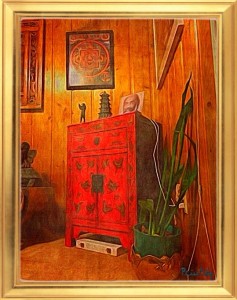Manage Your Energy Part 82: Spiritual Retreat Experiences with My Teacher, Part 4: Freeing Up Shame and Humiliation

“Imagine the broken places inside you are magnets for light.” ~Tawwaba
Learning to recognize, resonate with and reproduce different qualities of energy develops inner freedom and awareness, in addition to personal mastery.
The next stage of the spiritual retreat worked with paired qualities relating to feeling cast down into shame and humiliation, and being raised up and recognized for success. This practice assists in learning to be unattached to the highs we experience, and not pulling away from or wallowing in difficult experience.
The fall from a high state is inevitable. Learning to discover value and insight in all states, without clinging to them, is an important objective. Suffering, as the Buddhists tend to point out, is caused by attachment and aversion.
The aim of alternating intentionally between humiliation and feeling elevated through success is to find the divine in both states, to release attachment to either, and to become able to move freely between them, learning what is there to learn throughout.
Through dance, energy practice, and meditation, the retreat group followed our work the qualities I just mentioned with qualities and energies that help to release blame and self blame and enhance forgiveness and balance, and some that evoke strong, clear, connected self-esteem. The last practice of the morning generated incredibly tender, unprotected-but-powerful love. We sent this love to one another as a blessing, standing to receive it, eye to eye with a number of dance partners. 
Everyone has trauma. Not everyone is in touch enough to sense what it is or how it acts in shaping and restricting personality. For the most part, those who shut down their own awareness of trauma fear it having it arise. Also, since we tend to restrict in others what we cannot view or accept in ourselves, people who cannot face their own trauma tend to shut down those who communicate their own. Deeper feeling and expression get confined to breakdown or therapeutic situations. Working with the states and stages of our wounded humanity in energy-based, spiritual ways—without being psychological or singling anyone out—is freeing. This work creates openings that allow light and love to move through us without the obstructions caused by trauma.
Working also with the intention of allowing the divine to touch us, move through us, and to also be present within our tender spots is beautiful and intense. The practices allow us to see and experience ourselves and others very intimately, yet without discussion or delving into one another’s histories. Doing this feels universally human.
Of course, those few who know more about our personal journeys see more deeply into our faces and gestures and stand witness to us in a way that is both vulnerable and deeply healing. Opening the heart to attend to our different alchemy with each partner, and noticing the different flavors of each experience is a learning in itself. Some partners open us to places we have not yet touched in ourselves. Others may bring up a reflex to protect something. We can observe whether we can find a way to relax this and give of ourselves safely. Fortunately, most of the people at this particular retreat were lovely and loving and my Teacher floods us with love and creates a safe environment for practice.
What would it take for you to intentionally bring up shame and humiliation without getting stuck in them?
If you use feeling inflated or successful to avoid feeling shame, what would you need to do in order to feel safe being aware of both sets of feeling?
How can you move between them without getting stuck in either polarity?


 awareness, hence an exclusion. One healer I know refers to disowned or disparaged parts as “exiles.” He is talking about the psychological aspect. I am talking about the energy.
awareness, hence an exclusion. One healer I know refers to disowned or disparaged parts as “exiles.” He is talking about the psychological aspect. I am talking about the energy.
 themselves are not love. Love springs from awareness. It is only inasmuch as you see someone as he or she really is here and how and not as they are in your memory or your desire or in your imagination or projection that you can truly love them, otherwise it is not the person that you love but the idea that you have formed of this person, or this person as the object of your desire not as he or she is in themselves.
themselves are not love. Love springs from awareness. It is only inasmuch as you see someone as he or she really is here and how and not as they are in your memory or your desire or in your imagination or projection that you can truly love them, otherwise it is not the person that you love but the idea that you have formed of this person, or this person as the object of your desire not as he or she is in themselves.














